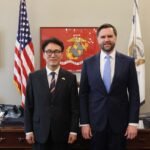 |
(Reuploaded because wrong link) The Ministry of Science and ICT (MSIT) revealed that recent artificial intelligence (AI) research successes were shared and plans for international cooperation were sought in ‘Global AI Frontiers Symposium 2025, hosted by the ministry in Seoul Dragon City, Yongsan-gu, Seoul, on the 27th. The symposium was joined by AI scholars and researchers taking part in the National AI Research Hub and the Global AI Frontier Lab of New York University, an institute dedicated to Korea-US joint AI research. The experts discussed topics such as the future vision for AI and AI security/credibility. In Part One of the symposium, Yann LeCun, co-director of the Global AI Frontier Lab and head AI scientist of Meta, and Yejin Choi, professor of the Human-Centered Artificial Intelligence (HAI) lab at Stanford University, gave keynote speeches about ‘Training World Models’ and ‘Democratizing Generative AI by Transcending Scaling Laws’, respectively. LeCun emphasized that “the now-prominent large language models (LLMs) will become obsolete within five years, and we must research AI capabilities inaccessible by LLMs”. “It is inaccurate to use the term ‘artificial general intelligence’ (AGI) to describe AI whose capabilities are on par with those of humans. It’s not feasible to lump together the intelligence of each human being as something ‘general’,” LeCun stated. “We need to look into advanced machine intelligence (AMI) that can stand face-to-face against humans in certain fields, like what we saw from AlphaGo back in 2016.” Prof. Choi also said that ‘the age of training AIs just by feeding it unrefined data is over,” and that “the hypothesis that larger magnitude LLMs are always better is also being taken under scrutiny.” “Instead of simply scaling the AI by expanding the training GPU size, we may require new strategies and approaches to improving AI. In the intermediate run, we may need more investments into fundamental research,” she said. She also emphasized that “from the perspective of possession, AI must be possessed by humans under values and characteristics of the human society, and must be developed and maintained not by a few companies, nations, or powerful people, but by all people across the globe.” She then stated that her research center, Stanford’s HAI lab, is open for collaboration with Korea. The speeches were followed by the AI Experts Roundtable, moderated by Kyunghoon Bae, Deputy Prime Minister and Minister of Science and ICT, and joined by Prof. LeCun, Prof. Choi, Kyunghun Cho, professor at NYU, and Kee-Eung Kim, professor at KAIST. LeCun said in the roundtable that he “was impressed by the decision to appoint an AI scientist as the deputy prime minister, something unseen anywhere else in the world,” when talking about Korea’s AI policies. He also advised that “in the near future, where humans receive all sorts of information through AI agents, it is necessary that AI is not controlled by a few select corporations, but that at least the base model is left as open source.” In Part Two, the National AI Research Hub and the Global AI Frontier Lab shared their collaborative works, and recent trends in state-of-the-art AI applications in healthcare and robotics were presented to the audience. Global AI Frontier Lab will host a workshop on the 28th and 29th to discuss research roadmaps for key AI algorithms, AI credibility and responsibility, and AI healthcare. Bae stated that [MSIT?] “plans to focus on the establishment of a global AI research cooperation ecosystem to further strengthen the international competitiveness of domestic AI research.” submitted by /u/Fermion96 |
Related Posts
Latest News from Korea
- Half of economists forecast 1% growth range for KoreaMore than half of economic experts expect Korea’s economic growth to remain in the 1 percent range for the time being, a local survey showed Sunday. In a survey conducted by Southernpost Inc. at the request of the Korea Enterprises Federation (KEF), 54 percent of 100 economics professors polled said Korea is likely to post growth in the 1 percent… Read more: Half of economists forecast 1% growth range for Korea
- PM meets Korean leaders, residents in New YorkPrime Minister Kim Min-seok has met with Korean leaders and residents in New York to thank them for their contributions to developing South Korea-U.S. relations, his office said Sunday. Kim has been on a five-day trip to Washington and New York, marking his first U.S. trip since taking office in July 2025. On Friday (local time), Kim met with U.S.… Read more: PM meets Korean leaders, residents in New York
- American rock climber Alex Honnold reaches top of Taipei 101 skyscraper without ropesTAIPEI, Taiwan — American rock climber Alex Honnold ascended the Taipei 101 skyscraper on Sunday without any ropes or protective equipment. Cheers erupted from a street-level crowd as he reached the top of the spire of the 508-meter (1,667-foot) tower about 90 minutes after he started. Wearing a red short-sleeve shirt, he waved his arms back and forth over his… Read more: American rock climber Alex Honnold reaches top of Taipei 101 skyscraper without ropes
- Pianist Kim Kang-tae wins 3rd prize at Liszt Piano Competition UtrechtPianist Kim Kang-tae, 29, has won third prize at the prestigious Liszt Piano Competition Utrecht in the Netherlands, the Kumho Culture Foundation (KCF) said Sunday. Kim performed Liszt’s Piano Concerto No. 1 in the final round, finishing behind Russia’s Alexander Kashpurin, who took first prize, and the U.K.’s Thomas Kelly, who placed second. His awards include 8,000 euros, or approximately… Read more: Pianist Kim Kang-tae wins 3rd prize at Liszt Piano Competition Utrecht
- Kim, Vance establish hotline to prevent misunderstandings over Coupang issueIn a meeting with U.S. Vice President JD Vance, Prime Minister Kim Min-seok emphasized that the Korean government is not treating U.S.-based e-commerce giant Coupang unfairly in its investigation into the company’s massive data breach and other labor-related allegations. To prevent misunderstanding over the Coupang matter and other diplomatic issues, the two exchanged direct contact numbers to establish a hotline,… Read more: Kim, Vance establish hotline to prevent misunderstandings over Coupang issue
Latest Entertainment from Korea
- LE’V Steps Into the Light: “Spotlight Soul” Captures the Artistry, Growth, and Glow of a New Era in the 2026 Season’s Greetings CollectionPhoto Credits: CHROMOSOME LE’V Illuminates 2026 with “Spotlight Soul” LE’V enters 2026 with a statement that feels both cinematic and deeply personal. His Season’s Greetings “Spotlight Soul” concept photos reveal a striking evolution — one that merges emotional depth with artistic clarity. The project, released as a collector’s visual experience, celebrates not just another year but LE’V’s firm grasp on identity, craft,… Read more: LE’V Steps Into the Light: “Spotlight Soul” Captures the Artistry, Growth, and Glow of a New Era in the 2026 Season’s Greetings Collection
- KiiiKiii Leesol & Haum Illuminate SPUR x Dior Addict’s January 2026 Issue with Daring Light, Sensual Motion, and New Beauty CodesPhoto Credits: SPUR Dior Starship Entertainment A New Year, A New Iconic Pairing SPUR Magazine opens 2026 with a collaboration that feels both intimate and electric. The January 2026 Issue Pictorial Preview showcases KiiiKiii Leesol and Haum in a visual dialogue infused with Dior Addict’s luminous rebellion. Titled “Light Moves: The Addict State of Mind”, the spread captures the interplay of motion, reflection, and self-definition—a signal… Read more: KiiiKiii Leesol & Haum Illuminate SPUR x Dior Addict’s January 2026 Issue with Daring Light, Sensual Motion, and New Beauty Codes
- Breaking Boundaries: ifeye × KITTO Taiwan Redefine Visual Storytelling in the January 2026 Pictorial — A Fusion of Innovation & IdentityPhoto Credits: Hi-Hat Entertainment The Convergence of Vision and Identity The January 2026 Pictorial from ifeye × KITTO Taiwan marks a defining moment in East Asian creative media. Framed as both a celebration and an evolution, the collaboration bridges art direction, fashion narrative, and technological fluidity to capture a new generation’s pulse. More than a photoshoot, this issue acts as a visual manifesto—an exploration of… Read more: Breaking Boundaries: ifeye × KITTO Taiwan Redefine Visual Storytelling in the January 2026 Pictorial — A Fusion of Innovation & Identity
- Xiaoting in Full Bloom: Kep1er’s Shining Star Redefines Power, Grace, and Global Glamour in Wonderland China’s January 2026 Cover StoryPhoto Credits: KLAP ENTERTAINMENT Kep1er’s Xiaoting Captures the Moment Kep1er’s Shen Xiaoting steps into 2026 as a muse of modern elegance, fronting the January 2026 Wonderland China cover with an aura that’s both futuristic and fiercely grounded. As one of the brightest stars of her generation, Xiaoting embodies the balance between aspiration and artistry that defines global pop’s next chapter. “Confidence is not just… Read more: Xiaoting in Full Bloom: Kep1er’s Shining Star Redefines Power, Grace, and Global Glamour in Wonderland China’s January 2026 Cover Story
- BTS’s V Radiates Timeless Charisma in GQ Korea x Cartier’s February 2026 Cover: A Monument to Modern Elegance and Emotional PrecisionPhoto Credits: GQ Korea – Cartier – BigHit Music. – BTS V x Cartier: The Sound of Stillness and Strength For GQ Korea’s February 2026 issue, the cover unfolds like a cinematic confession. BTS’s V (Kim Taehyung)—known for his magnetic duality of mystery and warmth—joins forces with Cartier, the house synonymous with precision, artistry, and legacy. Together, they create a visual symphony that celebrates… Read more: BTS’s V Radiates Timeless Charisma in GQ Korea x Cartier’s February 2026 Cover: A Monument to Modern Elegance and Emotional Precision
Learn People & History of Korea
- The Evolution of Busan: A Historical Journey Through South Korea’s Second Largest Metropolitan CityAncient Beginnings: The Founding of Busan Busan, known as the second largest metropolitan city in South Korea, has a rich history that dates back to ancient times. The earliest recorded existence of Busan can be traced to the Goryeo Dynasty, where it was referenced as a vital coastal settlement. Its strategic location along the southeastern coast of the Korean Peninsula… Read more: The Evolution of Busan: A Historical Journey Through South Korea’s Second Largest Metropolitan City
- The Evolution of Pyongyang: A Journey Through History, Economy, and Political DynamicsIntroduction to Pyongyang Pyongyang, the capital city of North Korea, serves as a prominent symbol of the nation’s history and culture. Geographically located on the banks of the Taedong River, in the southwest part of the country, Pyongyang is situated within a strategic area that has historically facilitated trade and cultural exchange. The city’s origins can be traced back to… Read more: The Evolution of Pyongyang: A Journey Through History, Economy, and Political Dynamics
- The Evolution of Seoul: From Ancient Korea to Modern Metropolis and BeyondAncient Beginnings: The Founding of Seoul The city of Seoul, known today as the vibrant capital of South Korea, has ancient roots that trace back to the Three Kingdoms period of Korea, specifically the kingdoms of Baekje and Silla. Evidence suggests that Seoul was originally established as a settlement given its strategic geographical advantages. Nestled within the Han River basin,… Read more: The Evolution of Seoul: From Ancient Korea to Modern Metropolis and Beyond
- Exploring Korean Traditional Games in Squid Game: From Season 2 to Upcoming Season 3Introduction to Korean Traditional Games Korean traditional games have long been an integral part of the country’s cultural landscape, offering more than mere entertainment. These games, which range from simple children’s pastimes to complex community activities, hold significant cultural significance and often serve as a means of preserving history and promoting social interaction. Rooted in centuries of tradition, these games… Read more: Exploring Korean Traditional Games in Squid Game: From Season 2 to Upcoming Season 3
- Unveiling the Past and Present of Saju: The Art of Korean Fortune TellingIntroduction to Saju Saju, a traditional Korean fortune-telling practice, is an intricate art that seeks to interpret an individual’s fate based on their birth date and time. The term “Saju” translates to “four pillars” in English, referring to the four critical components derived from these time markers: year, month, day, and hour. This method holds significant cultural value within South… Read more: Unveiling the Past and Present of Saju: The Art of Korean Fortune Telling















